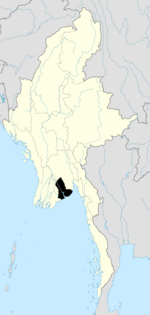Hlaingthaya Township
The township comprises 20 wards and nine village tracts and shares borders with Htantabin Township in the north and west, Insein Township, Mayangon Township, and Hlaing Township in the east across the Yangon River, and Twante Township in the south.
History
Hlaingthaya was incorporated as a township in 1989, following the 8888 Uprising, in order to resettle squatters in central Yangon. In 1991, authorities began establishing industrial zones and produce trading centres in the township. The largest industrial zone, Hlaingthaya, was established in 1995 and covers a land area of 567 hectares. In 1995, FMI City, a gated housing development, was established in the township. After the 2008 Cyclone Nargis, thousands of internally displaced refugees from the Ayeyarwady delta migrants re-settled in Hlaingthaya.
In 2019, plans to split the township into two (due to violence and over-population) were reported, although no official announcement could be found, the township had already been split in West and East constituencies for the 2020 Myanmar general election.
In the aftermath of the 2021 Myanmar coup d'état, Hlaingthaya became a centre of anti-coup resistance. On 14 March 2021, the military and police forces committed the Hlaingthaya massacre, killing at least 65 civilians and marking a major escalation in the military's use of force against civilians.
Commerce
Hlaingthaya is home to a dozen industrial zones, including Hlaingthaya, Shwe Linban, and Shwe Thanlwin, which housed more than 850 factories that employed 300,000 workers as of November 2019.
Infrastructure
The township is connected to other parts of Yangon across the Yangon River over the Aung Zeya Bridge and the Bayinnaung Bridge, and to TwanteTownship over the Pan Hlaing river by the Pan Hlaing Bridge.
Demographics
The 2014 Myanmar Census enumerated 687,867 persons in Hlaingthaya Township. The population density was 10,210.6 persons per square kilometre. 53.1% of residents were female, while 56.9% were male, and the median age was 25.6 years.
Education
The township has 46 primary schools, 8 middle schools and 4 high schools. West Yangon Technological University also maintains a campus in Hlaingthaya.
References
- ^ Kyaw Kyaw (2006). Frauke Krass; Hartmut Gaese; Mi Mi Kyi (eds.). Megacity yangon: transformation processes and modern developments. Berlin: Lit Verlag. pp. 333–334. ISBN 3-8258-0042-3.
- ^ "Hlaingthaya Township". Yangon City Development Committee. Archived from the original on 5 September 2005. Retrieved 2009-03-21.
- ^ Thar, Hein (2019-11-06). "Government seeks to tame Hlaing Tharyar, Yangon's wild west". Frontier Myanmar. Retrieved 2023-02-26.
- ^ "Myanmar Rising: Industrial and Special Economic Zones". HKTDC Research. 2016-08-16. Retrieved 2023-02-26.
- ^ "FMI City will be transferred back to government". Mizzima Myanmar News and Insight. 2019-09-24. Retrieved 2023-02-26.
- ^ "Profile Hlaingtharyar Township" (PDF). Myanmar Information Management Unit (UNIT). April 2009. Retrieved 21 March 2009.
- ^ Thar, Hein (2019-11-06). "Government seeks to tame Hlaing Tharyar, Yangon's wild west". Frontier Myanmar. Retrieved 2023-02-26.
- ^ "Government seeks to tame Hlaing Tharyar, Yangon's wild west". Frontier Myanmar. 2019-11-06. Retrieved 2022-08-18.
- ^ "Violence Against Protestors at Hlaing Tharyar". Myanmar Witness. 2022-03-14. Retrieved 2023-02-26.
- ^ Nway; Fishbein, Emily (2022-02-06). "Revolutionary roads: how the army tried to crush Yangon's most anti-coup district". The Guardian. ISSN 0261-3077. Retrieved 2023-02-26.
- ^ "[Myanmar] Increasing closures of factories and business since February harm the well-being of workers". The Nation Thailand. 2021-09-28. Retrieved 2023-02-26.
- ^ "Hlinethaya Township Report" (PDF). The 2014 Myanmar Population and Housing Census. October 2017.
External links
- "Profile Hlaingtharyar Township" April 2009, Myanmar Information Management Unit (MIMU)

